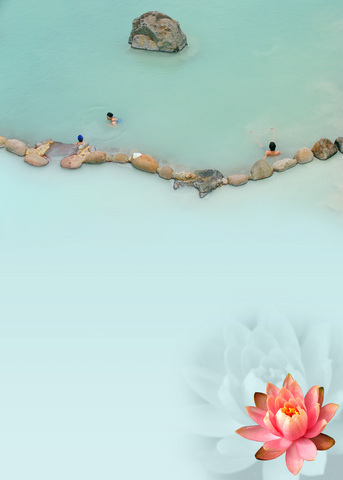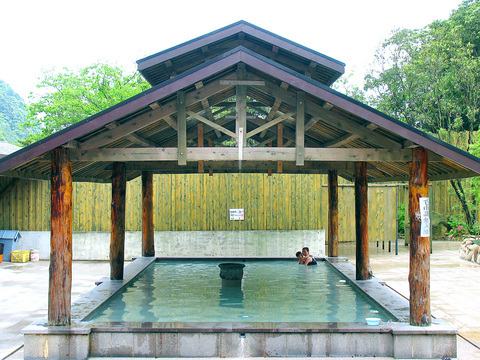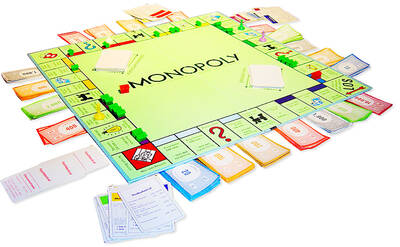You might think with the weather heating up that fewer people would be heading up the hills to take a dip in hot springs. You'd be wrong. This past weekend parking lots were full at hot spring hotels in Taipei County's Jinshan and neighboring Wanli.
You might also think that recent news reports regarding poor water quality at various hot springs in Beitou and Yangmingshan would keep people away from the pools. You'd be wrong again. Though the reports have slowed the bath business in those areas to little more than a trickle, Jinshan and Wanli seem unaffected. In fact, the reports may have been a boon for the north coast's hot springs hotels.
"We go to the hot springs most every weekend," said one bather at a hotel in Jinshan, who gave his name as Wu. "We usually go to Beitou. But with all the news of bad water, we decided to drive to Jinshan. I'm glad we did! It's actually nicer here."

For many people like Wu and his wife, a jaunt to one of Taiwan's many hot springs is the perfect end to a stress-filled week. And Jinshan and Wanli, crowning Taiwan's northern coast, offer more than therapeutic thermal springs -- although the springs themselves can be enough to occupy a weekend.
Few other activities put us in contact with the elements more than a hot spring bath, which can center us and focus our attention for a brief but important moment on our health: "What is causing those little aches?" you might find yourself asking, or "is my digestion good enough?" "What is sulfur, anyway? And why do I want to bathe in the smell of rotten eggs?"
The answer to that last one is particularly pertinent to anyone interested in visiting the hot springs in Wanli and Jinshan since many of these pools have a mild sulfur content. The springs at Changchun Valley Hot Springs Hotel, among the nicest of the area's hot spring hotels, have a mild sulfur content, but the odor is far from overpowering and sometimes even undetectable.

PHOTOS: TAIPEI TIMES
The sulfur colors the water shades of yellow or a milky white and is said to have therapeutic effects such as helping relieve asthma, rheumatism and shoulder, back and neck pains (though most any hot bath would), as well as treating gynecological problems. Cold sufferers might also find relief in sulfuric steam's ability to hydrolyze mucus.
But even if your only ailment is a long work week, the hot springs in Wanli and Jinshan can be just the cure. And just as Wu and his wife said, hot-springing can be a relaxing and rejuvenating weekend getaway. And with Jinshan only an hour away by bus, the focus is on the relaxing and rejuvenating, not the getting-away.
In fact, as was evident by the ebb and flow of cars at Changchun Valley Hot Springs Hotel in the hills outside Jinshan this past weekend, the preferred time of day to take a dip was in the morning. The hotel's parking lot was half filled with cars late Friday night and nearly empty by 2am, but filled with cars again just six hours later.
"The morning is the best time to enjoy the hot springs," Wu said. "It is the best way, I think, to start a day. And now that it's warmer, it's just too hot to get in the water in the afternoon hours."
Not that anyone is complaining. An afternoon excursion into Jinshan Township can make a weekend getaway feel like a mini-vacation. The town's Jinbaoli Old Street is lined with local vendors hawking amazingly fresh seafood and the town's local specialty, sweet potatoes, as well as a variety of shops cobbling sandals made to order.
If you fancy a taste of the local cuisine, you'll find a good selection of dishes at Jinbaoli Old Street's eponymous restaurant that doubles as a land-god temple. Huge amounts of food is prepared in the overhang in front of the temple and carted away by hungry visitors to one of the several adjacent dining halls. As with most traditional restaurants, you'd better come with friends as the portions are meant to be shared among several people.
Of course, the other option for dining is at most any of the hot spring hotels you might be calling home for the weekend. Changchun Valley, for instance, features a fine restaurant of light Japanese cuisine that is the perfect compliment to a dip in the springs.
In fact, the food served at many of the area's hot spring hotels is Japanese as the majority of hot springs in the Jinshan area are Japanese-style outdoor springs, though each of the hotels pipe spring water into the individual hotel rooms. But spending the weekend soaking in your hotel room would be a shame given the natural beauty surrounding places like the Changchun Valley Hot Springs Hotel.
"For me, a hot spring is only enjoyable in the outdoors," Wu said. "The natural environment [in Jinshan] is just as relaxing as the hot springs themselves."
For more information about hot springs in Taiwan, visit the Web site of the Tourism Bureau of the Republic of China at http://202.39.225.132/jsp/Eng/html/travel_tour/index.jsp?class=11%2B13.
GETTING THERE
Getting to Jinshan via public transportation is easy, but getting around once you're there can be a challenge. Several bus companies run routes to Jinshan from Chende Road, adjacent Taipei Main Station.
Guoguang Bus Company (
If you're wanting to try out one of the nice hotels in the hills, however, you'll need to hire the services of a taxi if you've no transportation of your own. A taxi from Jinshan to Changchun Valley, one of the area's more remote springs and arguably the nicest, will cost about NT$250.
TYPES OF HOT SPRINGS FOUND IN TAIWAN
Sodium Carbonate Springs: Water from this type of spring has no color, a clear appearance, and is known to help treat athlete's foot, arthritis, gastrointestinal disorders, skin disease and neuralgia. It also helps lower the blood pressure and reduce pressure on the heart. Sodium carbonate springs are the most common type of hot springs in Taiwan, and because of the sodium carbonate bubbles, the water can be made into a refreshing beverage.
Sulfur Springs: Water from these springs appears either yellow-brownish or milky and emits a strong smell of rotten eggs. The minerals in the water have positive therapeutic effects on skin disease, women's pro, asthma, neuralgia, arteriosclerosis, rheumatism and shoulder, neck and wrist pains; they also have a detoxifying and mucolytic effect. Limited oral intake can improve conditions such as constipation and diabetes; however, a doctor should always be consulted first. These springs are not suitable for inhalation therapy.
Ferrous Springs: Water from these springs contains a high concentration of metallic elements and can aid in the formation of blood cells, which is why it can help treat anemia, women's diseases, menopause problems and chronic eczema. In addition to bathing, the ferrous water is also drinkable and can alleviate anemia and treat fatigue.
Sodium Hydro Carbonate Springs: The colorless and odorless water from these springs beautifies the skin, accelerates tissue regeneration and promotes metabolism and blood circulation. It also has positive effects on gastrointestinal disorders, inflammation of the gall bladder, neuralgia, arthritis, external injury, liver disease, allergies, chronic skin disease, measles, etc.
Mud Springs: The water from these springs appears gray or even black and helps treat skin disease, neuralgia and gastrointestinal disorders. After bathing in these waters, the skin feels soft, thus earning the name "natural cosmetic." Glacial marine mud is obtained by the cooling of mud from these springs.
Salt or Hydrogen Sulfide Springs: The water from these springs has positive effects on skin diseases, women's diseases and problems of the intestines and stomach. SOURCE: Tourism Bureau of the Republic of China
HOT SPRINGS HOTELS IN THE JINSHAN/WANLI AREA
Shuidian Garden Farms (
45-2, Chiatou Road, Dapeng Village, Wanli Township, Taipei County (
Xikaiya Hot Springs Hotel (
166-1, Chiatou Road, Dapeng Village, Wanli Township, Taipei County (
Dabu Sulfur Spring Baths (
205-5, Chiatou Road, Dapeng Village, Wanli Township, Taipei County (
Huoshan Baths Sulfur Hot Springs (
211, Chiatou Road, Dapeng Village, Wanli Township, Taipei County (
Changchun Valley Hot Springs Hotel (
3, Pingding, Huangtan Village, Wanli Township, Taipei County (
Sounds of Nature Hot Springs (
28-3, Linkou, Chonghe Village, Jinshan Township, Taipei County (
Cape of Good Hope Hot Spring Holiday Hostel (
11 Ln 49, Chunghsin N Rd, Chonghe Village, Jinshan Township, Taipei County (
San Francisco Governor's Hot Springs (
196, Mingsheng Road, Jinshan Township, Taipei County (
Jinshan Youth Activity Center (
1, Chingnian Rd, Jinshan Township, Taipei County (
Jinshan Hot Springs Education Center (
11, Chungcheng Rd, Jinshan Township, Taipei County (

With one week left until election day, the drama is high in the race for the Chinese Nationalist Party (KMT) chair. The race is still potentially wide open between the three frontrunners. The most accurate poll is done by Apollo Survey & Research Co (艾普羅民調公司), which was conducted a week and a half ago with two-thirds of the respondents party members, who are the only ones eligible to vote. For details on the candidates, check the Oct. 4 edition of this column, “A look at the KMT chair candidates” on page 12. The popular frontrunner was 56-year-old Cheng Li-wun (鄭麗文)

“How China Threatens to Force Taiwan Into a Total Blackout” screamed a Wall Street Journal (WSJ) headline last week, yet another of the endless clickbait examples of the energy threat via blockade that doesn’t exist. Since the headline is recycled, I will recycle the rebuttal: once industrial power demand collapses (there’s a blockade so trade is gone, remember?) “a handful of shops and factories could run for months on coal and renewables, as Ko Yun-ling (柯昀伶) and Chao Chia-wei (趙家緯) pointed out in a piece at Taiwan Insight earlier this year.” Sadly, the existence of these facts will not stop the

Oct. 13 to Oct. 19 When ordered to resign from her teaching position in June 1928 due to her husband’s anti-colonial activities, Lin Shih-hao (林氏好) refused to back down. The next day, she still showed up at Tainan Second Preschool, where she was warned that she would be fired if she didn’t comply. Lin continued to ignore the orders and was eventually let go without severance — even losing her pay for that month. Rather than despairing, she found a non-government job and even joined her husband Lu Ping-ting’s (盧丙丁) non-violent resistance and labor rights movements. When the government’s 1931 crackdown

The first Monopoly set I ever owned was the one everyone had — the classic edition with Mr Monopoly on the box. I bought it as a souvenir on holiday in my 30s. Twenty-five years later, I’ve got thousands of boxes stacked away in a warehouse, four Guinness World Records and have made several TV appearances. When Guinness visited my warehouse last year, they spent a whole day counting my collection. By the end, they confirmed I had 4,379 different sets. That was the fourth time I’d broken the record. There are many variants of Monopoly, and countries and businesses are constantly